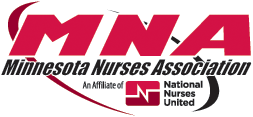Regulatory and Policy Nursing Specialist
A company leans on its board of directors for counsel, for investment, and for leadership. The board is a group of advisers with expertise above and/or outside of the company’s executive team. It’s disappointing to see that so many healthcare corporations don’t include nurses on their boards.
In the case of the 19 members of the Allina Health Board of Directors, a full seven are investment bankers or associated financial professionals. In fact, the list of board includes several CEOs (such as the head of Buffalo Wild Wings), a dean of a business school, a marketing guru, a supply chain VP for General Mills, and a retired attorney. Two physicians hold positions on the Board by virtue of their employment with Allina, in addition to one doctor who was appointed. Nowhere to be found? Even a single representative of healthcare’s largest and most trusted profession: nurses.
Interestingly enough, this failure to include representatives of healthcare’s most numerous profession seems to have occurred at nearly every level of Allina Health: the Allina executive leadership team, the United Foundation’s Board of Directors, the Mercy/Unity Foundation’s Board of Directors, the Phillips Eye Institute Foundation’s Board of Directors, and the Abbott Northwestern Foundation’s Board of Directors. At least Allina Health includes a Chief Nursing Officer at each of its hospital locations within that hospital’s leadership team.
When considering the composition of Allina’s Board, executive leadership team, and associated charitable foundation’s boards in the context of the impending nurse strike, it is easy to see why there exists a chasm between the nurses and Allina Corp. As the following evidence suggests, Allina does not value nurses as leaders and agents of positive change in the healthcare system. If it did, surely one, at least one, of the 125 members of Allina’s executive leadership team, Board of Directors, or nurse strike -affected hospital foundation’s board of directors would be or have been a nurse during his or her career. Maybe, just maybe, even a bedside nurse. Just one.
The composition of Allina’s board and executive leadership team comes down to one thing – priorities. What does a non-profit, charitable healthcare system value and prioritize? In the case of Allina, it appears to be investment banking. Contrary to the core values to which it pays much lip service, the priority of Allina Health is not patients, employees, quality care, or even healthcare at all. It is, at the end of the day, about one thing: big business.




